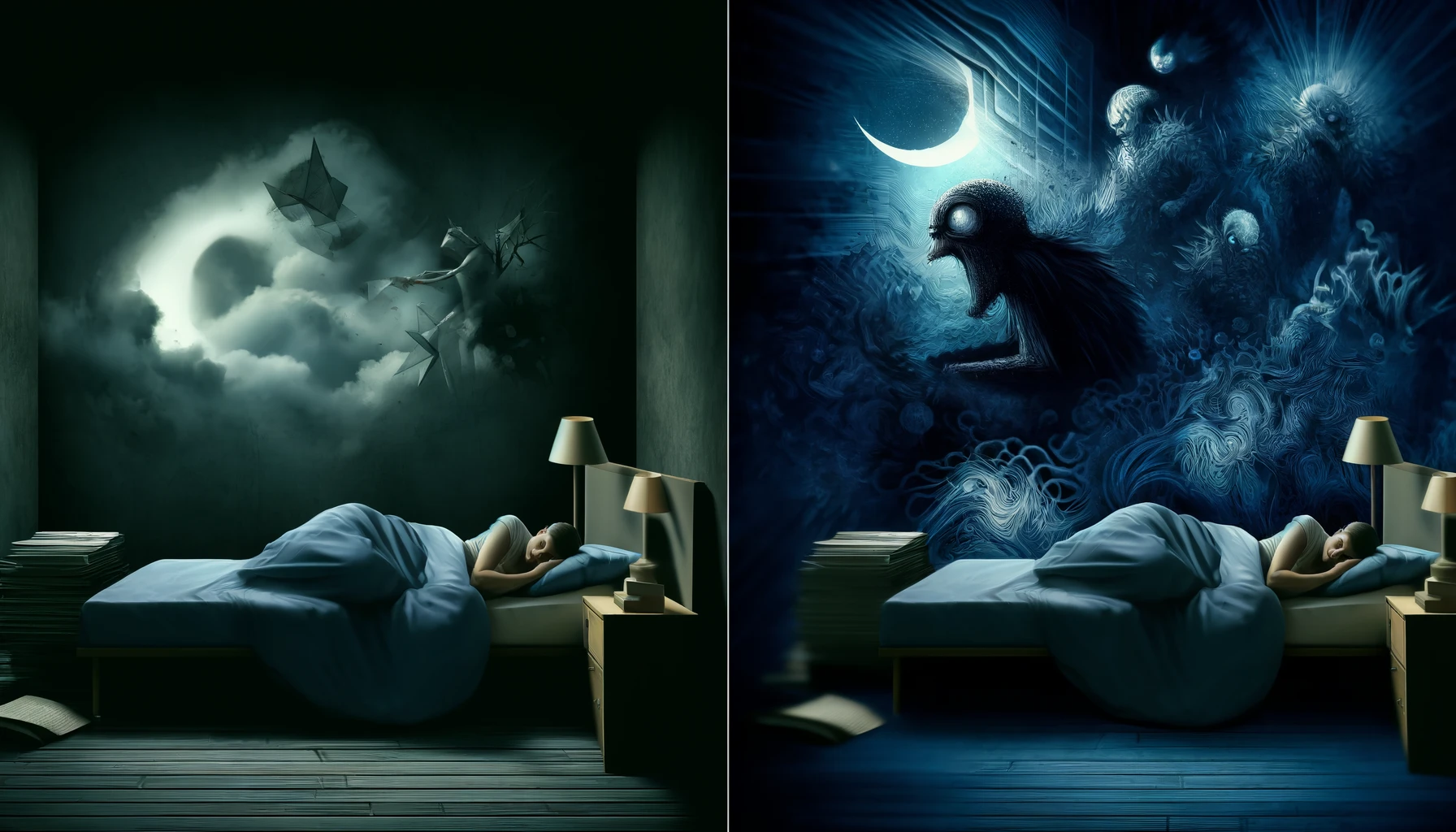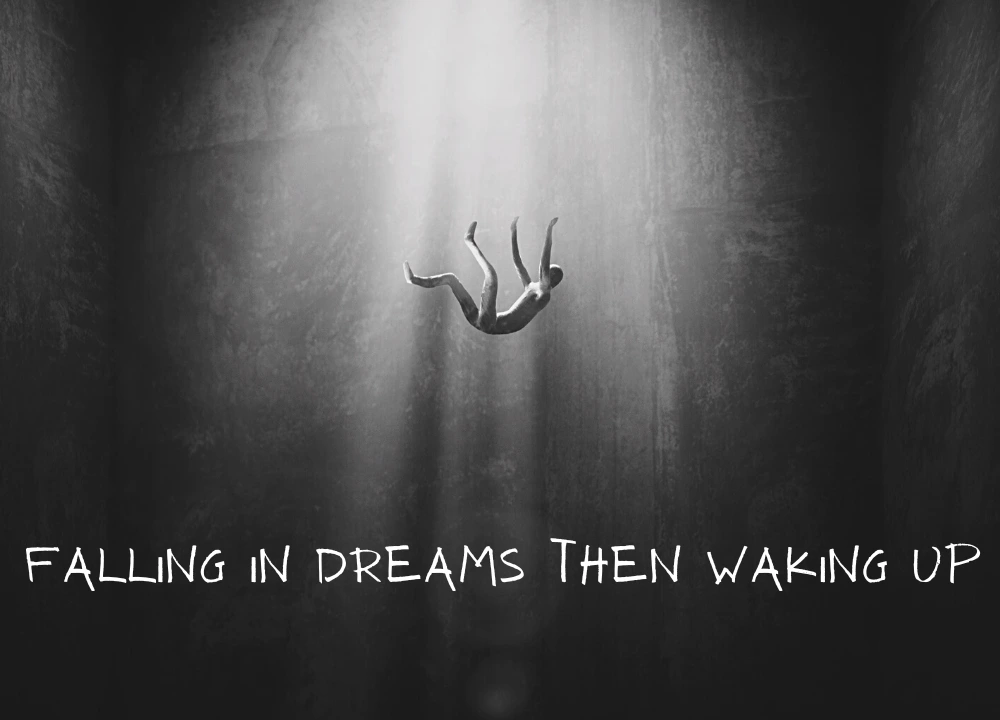Nightmares vs. Sleep Terrors: What’s the Difference and How to Cope?

Sleep disturbance can frequently disrupt our peaceful sleep, leaving us feeling uneasy and disturbed. You must have experienced sudden waking up, witnessed bizarre events, or felt horror, fear, or danger while sleeping. Such events led to anxiety, stress, insomnia, and sleep disorders. But the question is, what are they, and how to cope with them? Two buzzing words – Nightmares and Sleep Terrors, stand out as terrible night experiences but are often used as synonyms. They both can disturb sleep, but very few people are aware that these two are not similar in many other aspects. Understanding the difference between nightmares and sleep terrors is crucial to determine which experience you are facing and how to cope with it effectively. Understanding them completely allows you to find the desired solutions to avoid them as much as possible or strongly face them without disturbing your daily life. Sleep terrors are basically upgraded or super intense versions of nightmares that affect your sleep and well-being. Understanding the difference between the two is crucial to ensure peaceful sleep, undisturbed nights, and a refreshing morning. In this article, we will delve into the world of sleep disturbances in these two categories and discuss their characteristics, coping strategies and ensure restful nights of sleep.
Nightmares Vs. Sleep Terrors
To understand the difference between the two conditions, it’s important to delve into all the aspects of them and understand their meaning and characteristics. Understanding them may help choose the desired coping strategy according to the cause of it.
What are They?
Nightmares are vivid and disturbing dreams that cause a feeling of fear, terror, shock, anger, anxiety, disgust, or a sense of danger. Nightmares occur when we are in a deep sleep, i.e., REM (Rapid eye movement) sleep stage, and are more likely to be remembered after waking up. They do not need professional help until they start affecting your daytime activities and lifestyle. Nightmares can happen to any age group, whether kids or adults.
On the contrary, Sleep Terrors are more intense and scarier as they pick up a horrible episode of intense fear or terror during sleep and expose you to those incidents. Sleep terrors occur during the NREM sleep stage, where you are not in profound sleep but in the initial stage of it. This is basically a partial awakening stage. They are less likely to be remembered when you wake up, but your activities will show that you have faced a Sleep terror. Sleep terrors can generally happen to kids and teenagers and are very rare in the case of adults with age above 25 years. They peak at the age of six and keep reducing after that.
Characteristics of Nightmares and Sleep Terrors
After a frightening dream or a nightmare, you may wake up suddenly with a loud shout due to fear or anxiety. Such nightmares may leave you feeling frightened, sweaty along with fast heartbeat, extreme stress, and shivering. After such an experience, it’s difficult to go back to sleep again. As during REM sleep, you are in a lucid state, so you wake up in the same state, which leads to a lack of awareness and general confusion about whether you are in a dream or reality. Such nightmares are generally related to a scary incident where you run for your life, encounter a creepy or strange creature who is after you, or simply something as disturbing as falling from a building, drowning in the sea, or getting beaten up.
On the Contrary, Sleep terrors or night terrors are characterized by sudden waking up and sitting on bed with fear, crying, shouting, trembling, heavy breathing, extreme panic, staring wide-eyed, anxiety, and fumbling. These things happen if you wake up, but if you are still asleep, even during the Sleep terror, your face may become pale, your heart rate increase, and sweating become extreme, and you close your eyes and hands more tightly. The person could appear puzzled, disoriented, and unresponsive to comfort due to shock and terror. Waking up is a bit difficult in this situation, but you perform dreadful activities like holding the bedsheet tightly, moving your body, throwing stuff nearby you, disturbing your partner, or falling down. In extreme cases, sleepwalking, sleep paralysis, and serious injuries are also consequences of sleep terrors. However, when you wake up, the memory of the night terror vanishes, and you can’t remember anything that happened during the night.
Causes of Nightmares and Sleep Terrors
Stress and Anxiety
Nightmares and Sleep terrors may arise due to extreme stress, anxiety, worries, or emotional breakdown. The likelihood of suffering can be increased when people go through traumatic events, mental health issues, dealing with conflict, or going through substantial life changes. Stress related to relationships, careers, family, friends, life goals, exams, and even the environment of the home leads to night terrors and nightmares. Many people face severe depression, and nightmares due to trauma, and those traumatic situations come in front of your eyes during sleep terror. Many times, these nightmares are related to an event that is happening or going to happen in your real life, and your brain wants you to experience it before.
Early Childhood Experiences
It is believed that your brain is not fully developed till the age of 3, and if something unusual or negative happens before that time, it stays in your mind even after many years. Your brain visualizes those incidents even after years leading to nightmares. For example, adults may feel that throwing a baby in the air and catching him is a fun activity, but a minor mistake can give that child a horrific memory for a lifetime which later on results in nightmares and night terrors.
Medication and Substance use
Nightmares and Sleep terrors both can be a result of medication and substance use. There are a number of medications and drugs that are linked to nightmares. Some of them are beta-blockers, antipsychotics, Dopamine agonists, and antidepressants. Alcohol, metoprolol, temazepam, nicotine, and recreational drugs all can affect sleep patterns and make nightmares more frequent.
Just like nightmares, even sleep terrors are sometimes due to excess intake of certain medications, including sedatives, stimulants, blood pressure medications, sleeping pills, and specific psychiatric drugs. Lithium, sodium oxybate, Benzodiazepines, Antidepressants, Alcohol, and recreational drug are some of the drugs that affect the brain chemicals and cause these sleep terror episodes.
Genetic Factors
Night terrors are often due to genetics when these sleep terrors run in families and are inherited or genetically predisposed by them. If a child faces frequent night terrors, there is a possibility that some of the family members must likely have experienced a similar condition during their early life.
Medical Conditions and Sleep Disorders
Nightmares are often caused due to serious medical conditions like Parkinson’s disease, heart disease, sleepwalking, bipolar disorder, PTSD, depression, anxiety, eating disorders, etc. Along with that, sleep disorders like insomnia, erratic sleeping pattern, imbalance in the REM sleep stage, sleep apnea, restless legs syndrome, Bruxism, narcolepsy, etc., also increase the chances of nightmares and sleep terrors due to disturbed chemical reactions in the body and brain activity. Sleep terrors are also caused due to PTSD, bipolar disorder, depression, Parkinson’s disease, respiratory infections, sleep-related illnesses, epilepsy, migraines, or psychiatric disorders.
Coping strategies for Nightmares and Sleep Disorders
Now that you have understood the meaning, differences, and causes of nightmares and sleep terrors, it’s time to learn how to cope with them and maintain a peaceful sleep. Follow the below strategies and methods for coping with nightmares and Sleep Terrors.
Get Enough Sleep
Maintain a consistent sleep schedule and prioritize sleep over other worthless activities like scrolling or watching movies. It can stabilize your sleep schedule, provide enough sleep and reduce the chances of nightmares and sleep disorders.
Develop a calming bedtime routine
A regular bedtime routine is crucial to get a pleasant and peaceful sleep. Before going to bed, engage in some calming and peaceful activities like reading a book, practicing deep breathing, meditation, taking a hot water bath, solving puzzles, listening to soothing songs, and other relaxation techniques. Your subconscious mind relaxes after such activities, and the chances of nightmares and sleep terrors reduce due to that.
Avoid engaging in activities before sleeping
Avoid participating in any stimulating activity at least 1 hour before going to bed. Stay away from any emotional, disturbing, or negative content, such as video games, horror or action movies, disturbing news, social media scrolling, etc. Such things increase the chances of nightmares as it’s likely that what we see before sleep may turn into a nightmare for us.
Keep a Dream Journal
Dream journals help you pen down the key points of your dreams and identify a pattern or theme they follow. This activity helps you to understand the trigger points and potential sources that cause such nightmares and night terrors.
Cut down the intake of drinks and food
Avoid the intake of beverages such as alcohol and caffeine drinks. They cause restlessness, high blood pressure, and late-night awakenings. Such drinks cause nightmares more frequently and disturb your peaceful sleep. Along with that, reduce the intake of food at least 2 – 3 hours before sleep as eating increases metabolism, which increases brain activity leading to nightmares.
Rewrite the ending
When you are going to sleep, performing image rehearsal therapy is an effective option to change the tragic endings of nightmares. Basically, you have to check the dream you wrote in the dream journal in the morning and change its ending by writing it down as per your choice. After that, speak to yourself and communicate with your subconscious mind by chanting lines like “When I sleep, I will be able to change the tragic ending of this incident” and “I have the power to alter the endings and give them a positive end,” etc.
Create a sleep-friendly environment
Your environment impacts your subconscious mind and results in positive and optimistic dreams. Keep your bedroom dark, peaceful, and cozy, and set an appropriate room temperature that ensures peaceful sleep. Use earplugs, an eye mask, or a white noise machine if necessary.
Maintain a positive and safe sleeping space
Remove dangerous and potential hazards or objects from your room that can cause injury. During night terrors, you may fall down from the bed, throw things nearby you or even sleepwalk. In that situation, sharp and dangerous things can cause injury, so it’s better to remove such things from the room already and keep the windows and doors closed.
Stress Management
Stress management helps to avoid negative thoughts, forget unpleasant past incidents, and promote a happy and positive mindset. To perform stress management, practice daily yoga, meditation, and physical activities and engage in your hobbies that give your mind a satisfying and cheerful feeling.
Consult a professional doctor
If nightmares and sleep terrors become frequent, it’s always advisable to take professional help. They can analyze your situation, find the cause, and provide appropriate treatment options to overcome the condition. Sometimes, even minor talk therapy or counseling is enough to deal with the stress and anxiety which leads to sleep terrors. If these things don’t work, the professionals can conduct tests and provide medication based on that.
Conclusion
Nightmares and sleep terrors are disturbing experiences that can affect the pattern, quality, and time of sleep. In extreme cases, they lead to anxiety and depression at a serious level. But both are poles apart in terms of characteristics, consequences, and intensity. On the one hand, nightmares are common vivid dreams that show something unpleasant, whereas sleep terrors are more intense, manifesting episodes of extreme terror or panic. However, there are coping strategies that help a person to cope with such situations and avoid them as much as possible. The coping strategies, however, are similar as they both are disturbing sleep conditions that are linked to stress, lifestyle, past incidents, or present conditions. It’s important to maintain a proper sleep schedule, engage in calming activities, reduce intake of food and drinks, practice mindfulness, and perform techniques like lucid dreaming, image rehearsal therapy, etc. However, at any point in time, if you feel that these conditions are severely affecting your mental, emotional, and physical well-being, it is always better to seek consent from a professional doctor.





